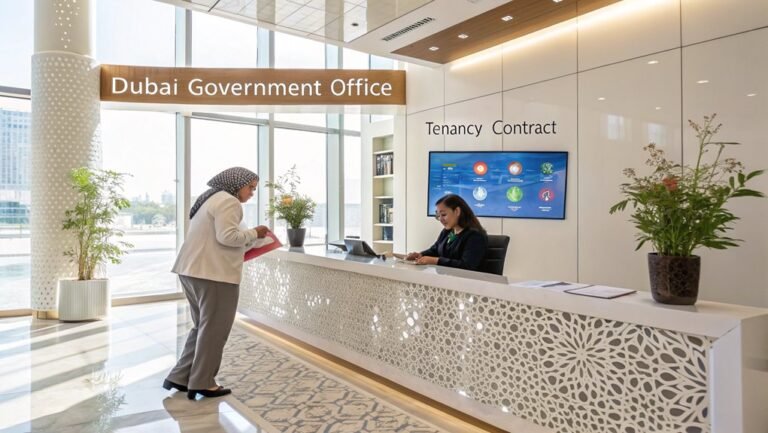Rights and Protections for Tenants in Dubai

When renting a property in Dubai, it's crucial to know your rights under RERA regulations. Understanding your rental contract is essential, especially details about security deposits and rent increases.
Knowing your maintenance and repair responsibilities can help prevent conflicts with your landlord.
What if you face unexpected eviction or disputes? Understanding your rights can help you navigate these issues.
Ensuring your privacy is respected throughout your tenancy is also vital. These factors can significantly impact your living experience in Dubai.
Let us help you find the perfect property. Contact us to get started.
Key Takeaways
In Dubai, tenants have several protections and rights under the law. They can challenge unfair rent increases or security deposit deductions at the Rental Dispute Settlement Centre (RDSC).
Landlords must provide a 12-month written notice for evictions based on specific reasons. Rent increases must comply with RERA regulations and need a 90-day notice.
Major repairs and structural maintenance are the landlord's responsibility. Tenants are entitled to a registered tenancy contract through the Dubai Land Department's Ejari system.
Rental Contracts
When renting a property in Dubai, understanding your rental agreement is crucial. This tenancy contract outlines the terms agreed upon by both tenant and landlord. It specifies your rights and obligations, ensuring both parties understand their responsibilities.
First, pay attention to the rent amount and payment schedule. The contract should state the rent, due dates, and acceptable payment methods.
Review the lease term duration, usually one year, and any renewal clauses. This helps you plan finances and stay compliant.
Check maintenance and repair obligations. The contract should specify who handles routine maintenance and major repairs. This prevents disputes and ensures proper property upkeep.
Be aware of any restrictions or rules, such as pet policies or subletting conditions. Knowing these helps avoid violations.
Ensure the contract is registered with the Dubai Land Department's Ejari system for added legal protection.
Security Deposits
Understanding your rental contract is vital, and this includes knowing all about security deposits. In Dubai, security deposits are typically required when you sign a rental agreement. These deposits serve as a safeguard for the landlord against potential damages or unpaid rent.
Usually, the amount is equivalent to five percent of the annual rent for unfurnished properties and ten percent for furnished ones. Make sure this amount is clearly stated in your contract.
When you move out, the landlord is obligated to return your security deposit, provided there are no significant damages or unpaid dues.
It's essential to document the property's condition during your move-in and move-out inspections. Taking photos and videos can serve as evidence in case of disputes.
The landlord can deduct from your deposit for any repairs beyond normal wear and tear. However, these deductions should be itemized and justified.
If you disagree with the deductions, you have the right to challenge them through the Rental Dispute Settlement Centre (RDSC).
Rent Increases
In Dubai, landlords must follow strict guidelines when raising rent to protect tenants. The Real Estate Regulatory Agency (RERA) has a rental increase calculator to ensure rent hikes are reasonable and based on market conditions.
Here are key points about rent increases in Dubai:
- RERA Calculator: Use the online RERA rental increase calculator to verify if a proposed rent hike is justified.
- Notice Period: Landlords must give a 90-day written notice before any rent increase takes effect. This gives you enough time to prepare or negotiate.
- Annual Caps: Rent increases are capped annually. The percentage depends on how your current rent compares to the market average.
- Disputes: If you find a rent increase unfair, you can file a complaint with the Dubai Rental Dispute Settlement Centre (RDSC).
- Renewal Agreements: Any rent increase must be clearly stated in the renewal agreement, which both you and your landlord must sign.
Maintenance Responsibilities
As a tenant in Dubai, you have the right to a well-maintained property. Landlords are responsible for major repairs and structural maintenance, including plumbing, electrical systems, and air conditioning units. They must ensure the property remains safe and habitable throughout your tenancy.
You are generally responsible for minor maintenance tasks and cleanliness. This includes replacing light bulbs, maintaining the garden, and ensuring proper use of appliances to prevent damage.
Report any significant issues to your landlord or property management immediately. Delaying can lead to further damage, for which you might be held responsible.
Review your tenancy contract carefully, as it may specify additional responsibilities for both parties. Familiarizing yourself with these terms helps avoid disputes and ensures a smooth living experience in your rental property.
Eviction Rules
Understanding eviction rules in Dubai real estate is crucial for tenants to protect their rights. Landlords can't evict tenants arbitrarily; they must follow specific regulations ensuring fair treatment. Knowing these rules can help you navigate any eviction process.
Eviction requires a valid reason. Common grounds include non-payment of rent, property damage, or illegal activities. For reasons like selling the property or using it for personal use, landlords must provide a 12-month written notice.
Key points to remember:
- Written Notice: Landlords must give a written notice, detailing the reason for eviction, sent via registered mail or notarized.
- 12-Month Notice: For personal use or selling, a 12-month notice is mandatory.
- Rental Increase: Eviction can occur if you refuse a legal rental increase, as per Dubai Land Department guidelines.
- Breach of Lease: You can be evicted for breaching any lease terms.
- Legal Procedures: Landlords need a court order to evict you legally.
Knowing these rules ensures any eviction process complies with the law, protecting your tenant rights.
Dispute Resolution
When facing an eviction notice in Dubai, knowing how to resolve disputes with your landlord is essential. The Rental Disputes Center (RDC) is the key institution for addressing rental conflicts. You can file a complaint online through their website, making the process convenient.
Gather all relevant documents before heading to the RDC. This includes your tenancy contract, proof of payment, and any correspondence with your landlord.
Once you file a complaint, the RDC will schedule a hearing. Both you and your landlord can present your cases. Prepare thoroughly, presenting clear arguments and evidence.
The RDC aims to mediate and resolve issues amicably. If necessary, they'll issue a binding verdict.
Know the laws protecting tenants in Dubai. Understanding your rights can empower you during negotiations and legal proceedings. Consult legal advice if needed.
The goal is to find a fair resolution that respects both parties' interests.
Privacy Rights
Your privacy rights as a tenant in Dubai are protected by specific regulations. Landlords must provide at least 24 hours' notice before entering your rented property, even for maintenance or inspections. This ensures you have time to prepare and maintain your privacy.
Landlords can't enter without your consent, except in emergencies. Emergencies include essential repairs to prevent significant property damage or address immediate health and safety concerns. In such cases, landlords must inform you as soon as possible.
To further protect your privacy, landlords can't interfere with your use of the property as long as you adhere to the terms of your lease agreement.
Key points to remember:
- Advance Notice: At least 24 hours' notice is required.
- Consent Requirement: Entry without your agreement is generally prohibited, barring emergencies.
- Emergency Situations: Landlords must notify you promptly.
- Lease Compliance: Your privacy is safeguarded if you follow lease terms.
- Legal Recourse: You can seek legal action if privacy rights are violated.
Understanding these rights will help you feel more secure in your rented home.
Subletting Policies
Understanding subletting policies in Dubai requires knowing the specific legalities and lease terms governing such arrangements. In Dubai, subletting a rental property without the landlord’s explicit consent is generally prohibited. Review your tenancy contract carefully to identify any clauses related to subletting. This contract will often detail whether subletting is permitted and under what conditions. Furthermore, Dubai subletting laws may also require the original tenant to obtain written permission from the landlord before subletting the property to another party. It is important to adhere to these laws and regulations to avoid any legal repercussions. Consulting with a legal expert or the Real Estate Regulatory Agency (RERA) in Dubai can provide further clarification on subletting policies and procedures.
If subletting is allowed, you'll typically need written approval from your landlord. This approval should outline the terms of the sublet, including the duration and the rent amount. Failing to secure the landlord's consent can lead to legal complications, such as eviction or financial penalties.
Dubai's Real Estate Regulatory Agency (RERA) oversees rental agreements. They ensure that both tenants and landlords adhere to established regulations. If you're considering subletting, consult RERA guidelines and possibly seek legal advice to ensure compliance.
Inform your subtenant about the primary lease terms and any rules set forth by the landlord. Transparency helps prevent misunderstandings and guarantees a smooth subletting experience for all parties involved.
Tenant Obligations
As a tenant in Dubai, you must adhere to several key responsibilities to ensure a harmonious rental experience. Understanding and fulfilling these duties ensures a smooth relationship with your landlord and helps maintain the property in good condition.
Firstly, always pay your rent promptly. Timeliness in rent payment is essential to avoid penalties and maintain a good tenant record.
Additionally, take care of minor maintenance and repairs. While the landlord handles major repairs, issues like changing light bulbs or fixing leaky faucets are your responsibility.
Respect the property's rules and regulations. Follow guidelines outlined in your tenancy agreement, including restrictions on pets or noise levels.
Avoid causing damage to the property. Any intentional or negligent damage could result in charges against you.
Lastly, provide proper notice before vacating the property. This gives the landlord sufficient time to find new tenants and ensures you comply with your lease terms.
Conclusion
As a tenant in Dubai, you're protected by RERA regulations, ensuring your rental experience is fair and transparent.
Always consult RERA guidelines. Understand your rights and obligations, from handling rent payments and maintenance to adhering to lease terms and subletting policies.
By staying informed and respectful of property rules, you can avoid disputes and enjoy a harmonious living environment.
Maintaining a good tenant record is essential for future rental opportunities.
Let us help you find the perfect property. Contact us to get started.






